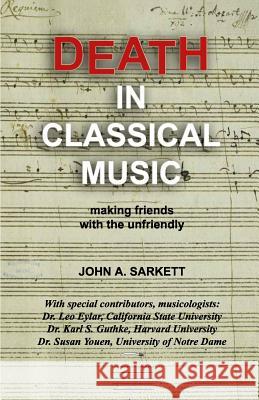Death in Classical Music: making friends with the unfriendly » książka
Death in Classical Music: making friends with the unfriendly
ISBN-13: 9781517326081 / Angielski / Miękka / 2015 / 226 str.
The treatment of life's most difficult problem by classical composers. Includes, as well, a large set of quotations on mortality. Readers say: "strangely comforting." "Takes on a taboo and breaks it down." "Helped me get past the loss of a loved one." Additionally, provides answers to questions like: 1. When and why did Richard Wagner become obsessed with death? 2. What did Wagner's intellectual hero -- Arthur Schopenhauer -- think of Wagner's Der Ring des Nibelungen? 3. Which work of his did Franz Schubert like 'better than the rest?' 4. What percentage of the top 25 operas deal in a significant way with death? 5. Who is the one known as "Friend Henry?" 6. 'Friend Henry' appears in which Mahler symphony? 7. Who leads the "Dance of Death?" 8. He wrote Isle of the Dead. 9. From which choral symphony comes the line: "Let it not be a death -- but a completion"? 10. He called death "the true goal of our existence.... this best and truest friend of mankind..... no longer terrifying to me, but is indeed very soothing and consoling " 11. He wrote music for the Novalis poem "Must the morning always return?" 12. His 200 cantatas are filled with a joyful faith about the reality of heaven for the believer. And much, much more..... A distinguished trio of scholars contributes a superb set of insightful essays as well: "Wagner and Schopenhauer," by Dr. Leo Eylar, professor and conductor, California State University, Sacramento "Arthur Schopenhauer reads Richard Wagner" by Dr. Karl S. Guthke, professor, Kuno Francke Research Professor of German Art and Culture, Harvard University "Horrifying Songs: Schubert's "Winterreise," Dr. Susan Youen, J. W. Van Gorkom Professor of Music, Professor of Musicology, University of Notre Dame Death in classical music: making friends with the unfriendly concludes with a large compendium of quotes on death from Christian, Eastern, ancient, and miscellaneous sources. John A. Sarkett is also the author of Obscure Composers, Obscure Composers 2, Obscure Composers 3, and Bach and Heaven: The Promise of Afterlife in the Text of the Cantatas.
Zawartość książki może nie spełniać oczekiwań – reklamacje nie obejmują treści, która mogła nie być redakcyjnie ani merytorycznie opracowana.











